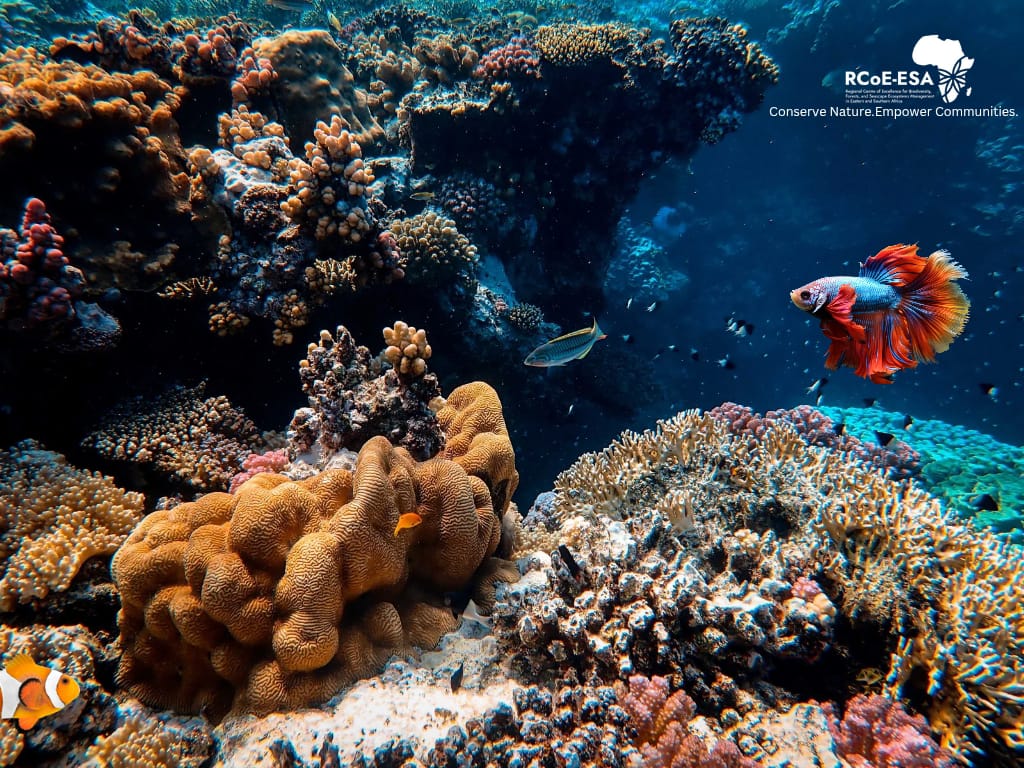
Unlocking Eastern and Southern Africa’s Marine Potential
The world’s oceans cover over 70% of the earth’s surface, serving as the planet’s largest habitat, yet only about 1% of these high seas are protected. This leaves the vast majority of marine life in high seas vulnerable to threats such as climate change, overfishing, and increased shipping activity.
The International Union for Conservation of Nature’s (IUCN) Red List of Ecosystems indicates that nearly 10% of marine animals and plants are facing extinction, and at least 41% of threatened marine species are affected by climate. Further, over half of the world’s mangrove ecosystems face collapse, posing a severe threat to coastal biodiversity and livelihoods.
Although it is home to some of the most diverse marine ecosystems in the world, statistics from Protected Planet indicate that only 9.57% of Eastern and Southern Africa's waters are protected. This is significantly below the 30% target set under the Kunming-Montreal Global Biodiversity Framework, underscoring the urgent need for innovative conservation strategies and regional collaboration to bridge the gap.
Countries covered; Angola, Comoros, Djibouti, Eritrea, Kenya, Madagascar, Mauritius, Mozambique, Namibia, Seychelles, Somalia, South Africa, Sudan and Tanzania.

The Great Blue Wall (GBW) initiative is a Western Indian Ocean (WIO)-led, African-driven roadmap to achieve a nature positive world by 2030. It aims to unlock unprecedented nature-based recovery efforts through the establishment of a transformational movement. Its goal is to dramatically accelerate and upscale ocean conservation actions while enhancing socio-ecological resilience and the development of a regenerative blue economy by catalysing political leadership and financial support. The GBW is an action focused and action-driven regional response to 3 interconnected crises, i.e. Biodiversity - Climate – Economy, with three clear objectives to be achieved by 2030. Under the Biodiversity Objective, the GBW aligns with Target 3 of the Montreal-Kunming Global Biodiversity Framework in its ambition to fairly and effectively protect and conserve 2 million km² (30% of the WIO) by 2030 and will advocate and provide support at regional and global levels to achieve complementary results. The GBW data dashboard can be accessed on the RCoE Geoportal (https://rcoe-geoportal.rcmrd.org ).
The Threat of Illegal Fishing and Deep-Sea Mining
Africa loses more than 11 billion usd every year to illegal fishing, with nearly 50% of the industrial illegal fishing vessels operating in African waters. This remains a significant problem, yet only 18 African countries have ratified the WTO Fisheries Subsidies Agreement, indicating laxity in regional enforcement mechanisms.
Additionally, deep-sea mining presents an emerging challenge. Although it offers economic benefits, it poses potential ecological and economic consequences. Alarmedly, no African country has taken an official stance on the issue.
International Agreements, Governance Challenges and Policy Gaps
Weak governance frameworks and policy fragmentation are among the most significant barriers to managing shared marine ecosystems. Countries like Kenya, Madagascar, and South Africa rely heavily on marine biodiversity for their economies, yet inadequate governance structures impede effective conservation efforts.
In June 2023, UN member states adopted the High Seas Treaty which seeks to protect marine biodiversity beyond national jurisdictions, covering over 60% of the ocean. However, participation by African countries remains low, with only Seychelles and Mauritius ratifying the treaty so far. Other African countries need to follow suit in an effort to promote sustainable ocean management within the continent. Similarly, the World Trade Organization (WTO) Fisheries Subsidies Agreement which is designed to combat illegal fishing, has only been ratified by six countries in the Eastern and Southern African region; Botswana, Comoros, Mauritius, Rwanda, Seychelles, and South Africa.
The African Union (AU) is reassessing its Integrated Maritime Strategy (AIMS 2050) to address governance gaps and integrate technological advancements for maritime surveillance.
Leveraging Data and Technology for Effective Marine Conservation
The recent Marine Seascape Ecosystem Management Data & Information Needs Workshop held in Dar es Salaam, Tanzania highlighted the transformative potential of data-driven conservation. The workshop, organized by Regional Centre for Mapping of Resources for Development (RCMRD), emphasized the need for data standardization, transparency, and regional data-sharing agreements. There is need to overcome political barriers to data-sharing to pave way for cross-border conservation efforts. Without collaboration on data governance, piecemeal initiatives will continue to hinder progress.
While some countries, including Kenya and South Africa, have developed marine data platforms, others struggle with fragmented and outdated datasets. The RCoE Data-Geoportal offers a promising step forward. It provides access to conservation data in the Eastern and Southern Africa region with the aim of enhancing ecosystem monitoring and data-driven decision making in ecosystem management.
Technological advancements such as remote sensing, GIS mapping, and drone surveillance have the potential to revolutionize marine ecosystem monitoring. Seychelles and South Africa have successfully been using these tools to track marine biodiversity and detect illegal fishing activities. Thus, expanding access to these technologies across the region, supported by funding partnerships and capacity-building initiatives, could enhance conservation outcomes significantly.
Further, engaging local communities is important for effective marine ecosystem management as they have invaluable indigenous knowledge in relation to understanding biodiversity and ecological patterns.
The Call to Action
The time to act is NOW! Eastern and Southern Africa region must embrace bold and collaborative approaches, harmonize marine conservation policies and integrate indigenous knowledge into sustainable management practices to unlock the full potential of its marine ecosystem.
Among the most critical actions is the adoption of data-driven ecosystem management. Data is increasingly seen as 'the new oil' in conservation, offering immense potential for monitoring and improving the management of the marine environment.
By acting decisively, policymakers, conservationists, and stakeholders can safeguard the region’s marine heritage for future generations, ensuring thriving oceans, resilient coastal economies, and sustainable blue economies across Eastern and Southern Africa.
Author: Abigael Sum








